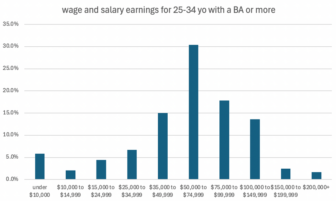MLive reports that: “College graduates are entering the most robust job market in more than a decade, according to an annual survey completed by Michigan State University (MSU). A survey from MSU’s College Employment Research Institute found that after several years of small gains, hiring for 2014-2015 is expected to jump 16 percent for new graduates. … “Employers are recruiting new college graduates at levels not seen since the dot-com frenzy of 1999-2000,” said Phil Gardner, director of MSU’s College Employment Research Institute. “Competition for qualified candidates is escalating to a degree rarely seen in the past 10 years.” (Emphasis added.)”
So much for what now passes as conventional wisdom that we have too many with four year degrees or more.
MLive reports from the MSU survey that: “Hiring of new graduates for almost every degree type will increase. The exception is for new graduates with master’s degrees, which project hiring to stay flat with last year’s numbers. The biggest jump is for those with MBAs, which companies are projected to hire 38 percent more of than last year. The increase for those with bachelor’s degrees is 16 percent over last year. PhD hiring will go up 20 percent and associate’s 19 percent.”
These results are consistent with the findings for 25-32 year olds of the Pew Research Center’s terrific “The Rising Cost of Not Going to College” report we explored in a previous post. As well as all the national data on both employment and income by education attainment. All of which consistently shows that those with a four year degree work more and earn more than those with lower education attainment and that the gap is widening.
Hopefully, the MSU survey results indicates that the economy is starting to generate, on an ongoing basis, lots of high skill jobs. That would be very good news. But what has been true for years is the American economy is not producing enough jobs at all skill levels. That effects those with four year degrees like everyone else. But what has not been true is that those with four year degrees are faring worse than those without. The exact opposite is the case. In a weak recovery those with four year degrees or more are doing best.
The bottom line: a four year degree or more––irrespective of what you major in––is the most reliable path (except for extraordinary athletes, entertainers and entrepreneurs) to a good paying job and career. End of story!






